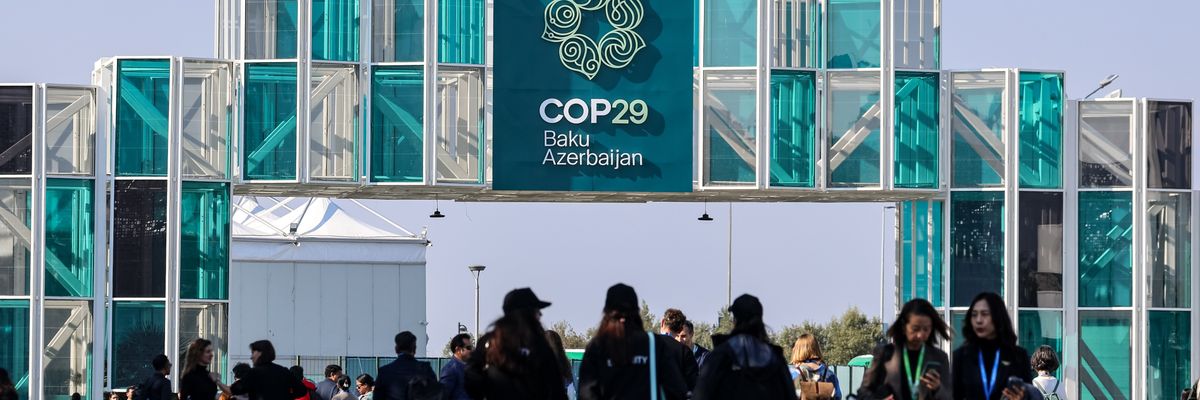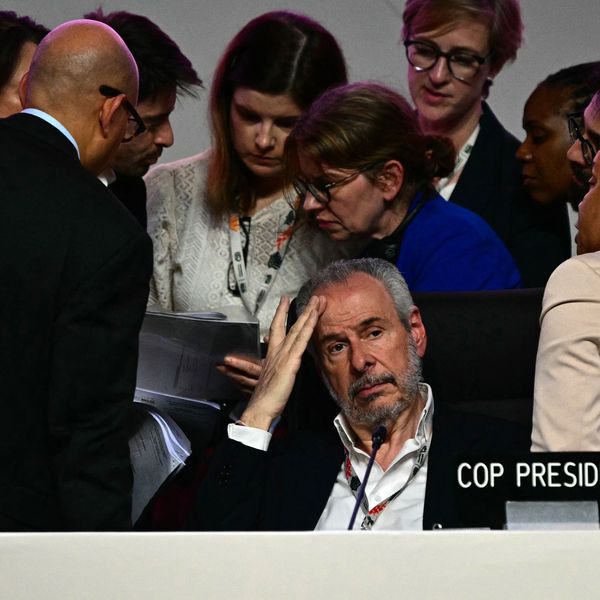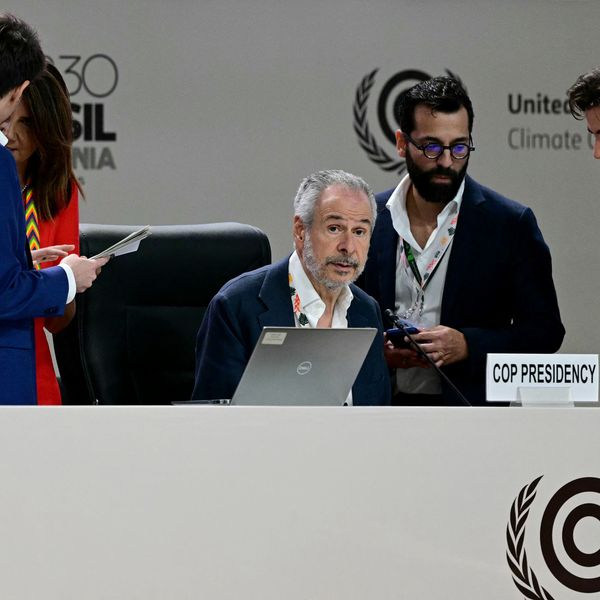
Participants walk by an entrance of COP29 in Baku, the capital of Azerbaijan on November 10, 2024.
Climate Campaigners Demand COP29 Free of 'False' Finance Solutions
"We are hurtling toward 3° of warming; human rights can't withstand dangerous distractions," said one climate justice advocate.
The 2024 United Nations Climate Change Conference has been called the "climate finance" conference, with participants expected to establish a new annual target for providing funds for the Global South to confront the climate crisis—but campaigners on Monday expressed concern that on the first day of the summit, there are already signs leaders will push for "false solutions" that only perpetuate planetary heating.
An annual climate finance target of $100 billion was set by policymakers in 2009, but that pledge expires at the end of 2024 and advocates say it's just a fraction of what is needed to help developing countries invest in climate crisis mitigation and adaptation to planetary heating.
Tasneem Essop, executive director of Climate Action Network, which includes more than 1,900 global civil society groups, told The Guardian that "a down payment of $5 trillion" annually in climate finance is needed, noting that "the debt is much larger."
But Sébastien Duyck, senior attorney for the Center for International Environmental Law, said the Azerbaijani presidency of the 29th Conference of the Parties of the U.N. Framework Convention on Climate Change (COP29) is already looking "to speed up the endorsement of new standards on carbon markets."
"This is extremely alarming. If this moves forward, it would be a real cop-out by governmental delegations gathered in Baku," said Duyck, referring to the capital of Azerbaijan, where COP29 is being held over the next 11 days.
Duyck pointed to new standards that were passed ahead of COP29 by a supervisory body with the aim of operationalizing and expanding carbon markets—pricing mechanisms that allow governments and other entities to trade greenhouse gas emission "credits."
"Fully operationalizing carbon markets on Day 1 would set a terrible precedent for the next two weeks, starting COP29 on a disastrous note and eroding the trust needed to achieve a bold, transformative agreement on finance," said Jax Bongon, climate justice policy officer for IBON International.
Proponents say carbon markets allow wealthy countries or corporations to purchase "carbon credits" from countries in the Global South; in exchange, governments in developing countries are paid to build renewable energy infrastructure, plant trees, or take other sustainable steps.
Those steps are thought to "buy time" for the wealthy country or company to cut down on their own pollution. But the scheme has been exposed as allowing companies to continue polluting without the supposed "offsets" actually helping to mitigate the climate crisis.
Lise Masson, climate justice and energy advocacy officer at Friends of the Earth (FOE), emphasized that "carbon markets are not climate finance, and we cannot accept these neocolonial schemes to be propped up as a success of COP29."
"Decisions at COP29 threaten to open the floodgates for a global carbon market that would have devastating impacts on communities in the Global South, on Indigenous peoples, and on small peasant farmers first and foremost," said Masson.
Marta Scaaf, who directs Amnesty International's climate justice program, warned COP29 delegates may "bypass accountability norms on Day 1 and issue recommendations to govern carbon markets, which are essentially pollution permits."
Essop suggested that carbon markets are being pushed as a false solution in order to save wealthy countries from having to provide what is needed for the Global South to mitigate the climate crisis and adapt to the hurricanes, flooding, drought, and other extreme conditions that have been linked to planetary heating.
"Five trillion dollars is what we come here to demand," Essop said. "Governments out there are absolutely capable of finding the money that does wrong in the world. They found the money for military spending. They found the money for the genocide in Gaza. They find the money to subsidize and support the fossil fuel industry. To come here and say that they do not have money is absolutely untruthful and unacceptable."
Meena Raman of FOE Malaysia stressed that climate finance "isn't charity; it's reparations for a climate debt long overdue."
"Grants must replace loans, and loss and damage funding must also be scaled up tremendously to meet the needs of impacted countries in the Global South," said Raman. "Debt cancellation for the Global South is essential to break cycles of injustice. The money exists: redirecting funds from global military spending and climate justice are paths forward."
The international human rights group Global Witness drove home the point by taking over the web address that some might arrive at if they were looking for more information about COP29.
Visitors to cop29.com on Monday were met with the words "Payback Time."
"We've taken over cop29.com to unite the millions of people demanding justice," said Global Witness. "This summer broke heat records again. Wildfires, droughts, and storms are killing thousands and driving up the cost of food, energy, and insurance. Worse is coming."
"COP29 is our moment," added the group. "The loss and damage fund was created to help developing nations that are being hit hardest by climate chaos... Fossil fuel companies rake in billions. They must pay into the fund to help communities rebuild, adapt, and repair some of the damage they've caused."
An Urgent Message From Our Co-Founder
Dear Common Dreams reader, The U.S. is on a fast track to authoritarianism like nothing I've ever seen. Meanwhile, corporate news outlets are utterly capitulating to Trump, twisting their coverage to avoid drawing his ire while lining up to stuff cash in his pockets. That's why I believe that Common Dreams is doing the best and most consequential reporting that we've ever done. Our small but mighty team is a progressive reporting powerhouse, covering the news every day that the corporate media never will. Our mission has always been simple: To inform. To inspire. And to ignite change for the common good. Now here's the key piece that I want all our readers to understand: None of this would be possible without your financial support. That's not just some fundraising cliche. It's the absolute and literal truth. We don't accept corporate advertising and never will. We don't have a paywall because we don't think people should be blocked from critical news based on their ability to pay. Everything we do is funded by the donations of readers like you. Will you donate now to help power the nonprofit, independent reporting of Common Dreams? Thank you for being a vital member of our community. Together, we can keep independent journalism alive when it’s needed most. - Craig Brown, Co-founder |
The 2024 United Nations Climate Change Conference has been called the "climate finance" conference, with participants expected to establish a new annual target for providing funds for the Global South to confront the climate crisis—but campaigners on Monday expressed concern that on the first day of the summit, there are already signs leaders will push for "false solutions" that only perpetuate planetary heating.
An annual climate finance target of $100 billion was set by policymakers in 2009, but that pledge expires at the end of 2024 and advocates say it's just a fraction of what is needed to help developing countries invest in climate crisis mitigation and adaptation to planetary heating.
Tasneem Essop, executive director of Climate Action Network, which includes more than 1,900 global civil society groups, told The Guardian that "a down payment of $5 trillion" annually in climate finance is needed, noting that "the debt is much larger."
But Sébastien Duyck, senior attorney for the Center for International Environmental Law, said the Azerbaijani presidency of the 29th Conference of the Parties of the U.N. Framework Convention on Climate Change (COP29) is already looking "to speed up the endorsement of new standards on carbon markets."
"This is extremely alarming. If this moves forward, it would be a real cop-out by governmental delegations gathered in Baku," said Duyck, referring to the capital of Azerbaijan, where COP29 is being held over the next 11 days.
Duyck pointed to new standards that were passed ahead of COP29 by a supervisory body with the aim of operationalizing and expanding carbon markets—pricing mechanisms that allow governments and other entities to trade greenhouse gas emission "credits."
"Fully operationalizing carbon markets on Day 1 would set a terrible precedent for the next two weeks, starting COP29 on a disastrous note and eroding the trust needed to achieve a bold, transformative agreement on finance," said Jax Bongon, climate justice policy officer for IBON International.
Proponents say carbon markets allow wealthy countries or corporations to purchase "carbon credits" from countries in the Global South; in exchange, governments in developing countries are paid to build renewable energy infrastructure, plant trees, or take other sustainable steps.
Those steps are thought to "buy time" for the wealthy country or company to cut down on their own pollution. But the scheme has been exposed as allowing companies to continue polluting without the supposed "offsets" actually helping to mitigate the climate crisis.
Lise Masson, climate justice and energy advocacy officer at Friends of the Earth (FOE), emphasized that "carbon markets are not climate finance, and we cannot accept these neocolonial schemes to be propped up as a success of COP29."
"Decisions at COP29 threaten to open the floodgates for a global carbon market that would have devastating impacts on communities in the Global South, on Indigenous peoples, and on small peasant farmers first and foremost," said Masson.
Marta Scaaf, who directs Amnesty International's climate justice program, warned COP29 delegates may "bypass accountability norms on Day 1 and issue recommendations to govern carbon markets, which are essentially pollution permits."
Essop suggested that carbon markets are being pushed as a false solution in order to save wealthy countries from having to provide what is needed for the Global South to mitigate the climate crisis and adapt to the hurricanes, flooding, drought, and other extreme conditions that have been linked to planetary heating.
"Five trillion dollars is what we come here to demand," Essop said. "Governments out there are absolutely capable of finding the money that does wrong in the world. They found the money for military spending. They found the money for the genocide in Gaza. They find the money to subsidize and support the fossil fuel industry. To come here and say that they do not have money is absolutely untruthful and unacceptable."
Meena Raman of FOE Malaysia stressed that climate finance "isn't charity; it's reparations for a climate debt long overdue."
"Grants must replace loans, and loss and damage funding must also be scaled up tremendously to meet the needs of impacted countries in the Global South," said Raman. "Debt cancellation for the Global South is essential to break cycles of injustice. The money exists: redirecting funds from global military spending and climate justice are paths forward."
The international human rights group Global Witness drove home the point by taking over the web address that some might arrive at if they were looking for more information about COP29.
Visitors to cop29.com on Monday were met with the words "Payback Time."
"We've taken over cop29.com to unite the millions of people demanding justice," said Global Witness. "This summer broke heat records again. Wildfires, droughts, and storms are killing thousands and driving up the cost of food, energy, and insurance. Worse is coming."
"COP29 is our moment," added the group. "The loss and damage fund was created to help developing nations that are being hit hardest by climate chaos... Fossil fuel companies rake in billions. They must pay into the fund to help communities rebuild, adapt, and repair some of the damage they've caused."
- COP29: Leaders must commit to fair climate financing and fully phasing out fossil fuels ›
- 'We're Playing With Fire': World on Track for 'Catastrophic' 3.1°C of Warming ›
- In 'Sick Joke', COP29 Host Azerbaijan to Raise Gas Production by a Third ›
- Critics Call COP29 Climate Finance Draft 'Slap in the Face' by Rich Nations | Common Dreams ›
- After Ending in Overtime, COP29 Called 'Big F U to Climate Justice' | Common Dreams ›
The 2024 United Nations Climate Change Conference has been called the "climate finance" conference, with participants expected to establish a new annual target for providing funds for the Global South to confront the climate crisis—but campaigners on Monday expressed concern that on the first day of the summit, there are already signs leaders will push for "false solutions" that only perpetuate planetary heating.
An annual climate finance target of $100 billion was set by policymakers in 2009, but that pledge expires at the end of 2024 and advocates say it's just a fraction of what is needed to help developing countries invest in climate crisis mitigation and adaptation to planetary heating.
Tasneem Essop, executive director of Climate Action Network, which includes more than 1,900 global civil society groups, told The Guardian that "a down payment of $5 trillion" annually in climate finance is needed, noting that "the debt is much larger."
But Sébastien Duyck, senior attorney for the Center for International Environmental Law, said the Azerbaijani presidency of the 29th Conference of the Parties of the U.N. Framework Convention on Climate Change (COP29) is already looking "to speed up the endorsement of new standards on carbon markets."
"This is extremely alarming. If this moves forward, it would be a real cop-out by governmental delegations gathered in Baku," said Duyck, referring to the capital of Azerbaijan, where COP29 is being held over the next 11 days.
Duyck pointed to new standards that were passed ahead of COP29 by a supervisory body with the aim of operationalizing and expanding carbon markets—pricing mechanisms that allow governments and other entities to trade greenhouse gas emission "credits."
"Fully operationalizing carbon markets on Day 1 would set a terrible precedent for the next two weeks, starting COP29 on a disastrous note and eroding the trust needed to achieve a bold, transformative agreement on finance," said Jax Bongon, climate justice policy officer for IBON International.
Proponents say carbon markets allow wealthy countries or corporations to purchase "carbon credits" from countries in the Global South; in exchange, governments in developing countries are paid to build renewable energy infrastructure, plant trees, or take other sustainable steps.
Those steps are thought to "buy time" for the wealthy country or company to cut down on their own pollution. But the scheme has been exposed as allowing companies to continue polluting without the supposed "offsets" actually helping to mitigate the climate crisis.
Lise Masson, climate justice and energy advocacy officer at Friends of the Earth (FOE), emphasized that "carbon markets are not climate finance, and we cannot accept these neocolonial schemes to be propped up as a success of COP29."
"Decisions at COP29 threaten to open the floodgates for a global carbon market that would have devastating impacts on communities in the Global South, on Indigenous peoples, and on small peasant farmers first and foremost," said Masson.
Marta Scaaf, who directs Amnesty International's climate justice program, warned COP29 delegates may "bypass accountability norms on Day 1 and issue recommendations to govern carbon markets, which are essentially pollution permits."
Essop suggested that carbon markets are being pushed as a false solution in order to save wealthy countries from having to provide what is needed for the Global South to mitigate the climate crisis and adapt to the hurricanes, flooding, drought, and other extreme conditions that have been linked to planetary heating.
"Five trillion dollars is what we come here to demand," Essop said. "Governments out there are absolutely capable of finding the money that does wrong in the world. They found the money for military spending. They found the money for the genocide in Gaza. They find the money to subsidize and support the fossil fuel industry. To come here and say that they do not have money is absolutely untruthful and unacceptable."
Meena Raman of FOE Malaysia stressed that climate finance "isn't charity; it's reparations for a climate debt long overdue."
"Grants must replace loans, and loss and damage funding must also be scaled up tremendously to meet the needs of impacted countries in the Global South," said Raman. "Debt cancellation for the Global South is essential to break cycles of injustice. The money exists: redirecting funds from global military spending and climate justice are paths forward."
The international human rights group Global Witness drove home the point by taking over the web address that some might arrive at if they were looking for more information about COP29.
Visitors to cop29.com on Monday were met with the words "Payback Time."
"We've taken over cop29.com to unite the millions of people demanding justice," said Global Witness. "This summer broke heat records again. Wildfires, droughts, and storms are killing thousands and driving up the cost of food, energy, and insurance. Worse is coming."
"COP29 is our moment," added the group. "The loss and damage fund was created to help developing nations that are being hit hardest by climate chaos... Fossil fuel companies rake in billions. They must pay into the fund to help communities rebuild, adapt, and repair some of the damage they've caused."
- COP29: Leaders must commit to fair climate financing and fully phasing out fossil fuels ›
- 'We're Playing With Fire': World on Track for 'Catastrophic' 3.1°C of Warming ›
- In 'Sick Joke', COP29 Host Azerbaijan to Raise Gas Production by a Third ›
- Critics Call COP29 Climate Finance Draft 'Slap in the Face' by Rich Nations | Common Dreams ›
- After Ending in Overtime, COP29 Called 'Big F U to Climate Justice' | Common Dreams ›

